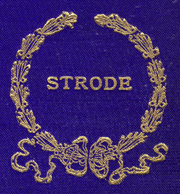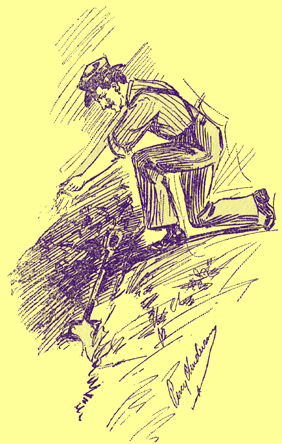 I wish to make a few remarks about the weather.
I wish to make a few remarks about the weather.From Cornfield Philosophy, by C. D. Strode, Illustrated, Chicago: The Blakely Printing Co., 1902; pp. 135-156.
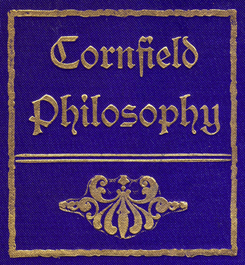
137
SPRING WEATHER.
_______________
(The Spring of ’99.)
_______________
 I wish to make a few remarks about the weather.
I wish to make a few remarks about the weather.
This is not usually an interesting subject, but the weather this spring has been so unusual as to merit special attention.
I know that the weather is usually unusual. It is rarely satisfactory. Each season is either the hottest or coldest, wettest or dryest, that ever was. But the spring which just closed was unusually unusual. It was the rottenest spring I ever saw.
The weather has been so bad as to seriously retard the growth of crops. I never saw spring onions so small at this season, or so few in a bunch. It is very disappointing. It is the same with radishes. There is compensation in some measure, however, in the fact that the backward spring has lengthened the season for greens.
The oldest inhabitant cannot remember when we had such a spring before. It has been the most uncomfortable time I have ever spent. There has been a cold, raw 138 wind blowing off the lake for the past three months. There were a few warm days in early May, at which time I got that spring feeling and started in with a dull spade to make some garden in our little backyard, while all the neighbors gathered on their back porches and watched me. The ground was cold and unresponsive and seemed to resent being dug up — especially with that kind of a spade. I persevered, however, until I had an irregular bed of large, shiny clods turned up. I chopped them into smaller clods or drove them back down into the earth whence they came until the bed was fairly flat on top. Then I sowed the seeds.
“They will never grow,” my wife said despondently, while my neighbors, being mostly of German extraction and inclined to conservative views of life, shook their heads and sent out for more beer.
My children took a more hopeful view, especially my youngest, a golden-haired angel of seven summers.
“May I come out and pick a radish whenever I want to, papa?” she asked.
I told her she might if she would be a good girl, but my heart misgave me. What depressed me was the entire absence of loose dirt of any kind. I raked around until the seeds had disappeared in the crevices and chasms between the clods and then leaned on my spade, while my family clustered around in mute sympathy, and all around, and for two or three stories above, the neighbors looked down and made remarks in languages I could not understand.
The wind had changed while I worked and had grown raw and cold. Dull, gray clouds had blown in from the lake. I gazed about me vacantly.
“If it rains,” I said, passing my hand across my brow, “if it comes a good, soaking rain —”
139“Come away,” my wife said, and she took me by the arm and led me into the house.
And none of the seeds ever came up. My little girl says she believes I got them planted upside down.
But it was the weather, I think. That and the clods — the air-dried clods. It has rained a little, but it had no effect on the clods except to make them harder. One of the neighbors, who used to be a market gardener, tells me that the frosts of next winter will cause them to disintegrate, but I do not believe it. Those clods have come to stay and they illustrate how a man may, with the best intentions, turn things loose in the world which he cannot control, and which go on working evil.
I created these clods with no thought of evil and now I cannot destroy them. They have already begun to work evil in the world. A thoughtless, care-free boy filled his pocket with some of the smallest of them and went out and threw one at a dog and lamed him — maybe for life. I was coming home one evening and stepped on one which had been carelessly left on the sidewalk. It rolled beneath my foot and I fell and broke a board in the walk.
As a further illustration of this point mythology tells of a sculptor who modeled a cow of such perfect proportions that he prayed the gods to endow it with life. The gods granted his request and the cow came to life and hooked him. He hadn’t thought of that.
Another thing with such weather as we had this spring has rendered difficult is the question of clothes. By the most careful management my winter clothing lasted me until the first of May. The garments were a total wreck but they brought me through. Since that time I have worn summer underclothing and have almost frozen at times.
140Then I had a heavy winter suit which I had worn for several winters and a good part of several summers. This spring I had figured on dispensing with them for good as soon as it should become warm. But it did not become warm. It remained cold and raw and I wore the winter clothes. They became worse and worse. The pantaloons bagged more and more at the knees and grew shinier and shinier on the seat and the coat had to be trimmed around the bottom every morning where the lining was torn and hung down.
Along early in May a number of my out-of-town friends were standing in front of the Great Northern Hotel one morning when I went slinking along to the office.
“Hello!” said Bennett; “here’s Strode and I’ll be durned if he isn’t still wearing that coat and vest.”
At last I could stand it no longer. I grew desperate and reckless. Week after week that awful wind blew off the lake, and one day, in sheer desperation, with my heart full of bitterness and resentment and eyes full of dirt and sand, I went and bought a light green suit of clothes and put them on.
“My God!” Kimball said when he saw me. “What have you done?”
141
THE SUMMER TIME.
_______________
(An Essay.)
_______________
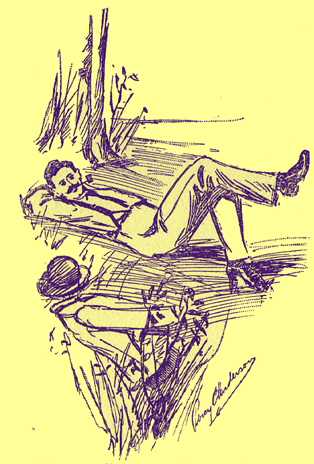 For those who prefer warm weather, the summer is the most gladsome time in the year. For those who prefer cold weather and the exhilarating sports of skating, sleighing, ice cutting, log hauling and so forth, winter is the time. Some people prefer the balmy freshness of spring or the golden brightness of autumn.
For those who prefer warm weather, the summer is the most gladsome time in the year. For those who prefer cold weather and the exhilarating sports of skating, sleighing, ice cutting, log hauling and so forth, winter is the time. Some people prefer the balmy freshness of spring or the golden brightness of autumn.
As for me, I love to lie on the greensward in summer and in winter I love to lie by the fire.
When I started to write this essay I scarcely knew how to head it. At first I thought I would call it just “Summer,” but that head is too short to look well. Then I thought of “The Summer,” but where there are so many summers “The Summer” is not definite enough and might lead to misunderstanding. The reader might think I meant some particular summer, like the summer 142 of ’79 or ’83, or something like that, when nothing is further from my intention. What I mean is just abstract summer, summer in general. I finally selected as a heading, “The Summer Time.” I don’t know why I did this.
There are three months in summer. June, July and August. That is the almanac arrangements but sometimes it slops over a little at both ends. June is the month of roses, July is the month during which the watermelon first appears upon the market, and August is a good time to cut up corn. I am fond of roses and watermelons, but I do not like to cut up corn. The reason I do not like to cut up corn is that it must be done with a sharp tool called a “corn knife,” and whenever I get hold of a sharp instrument of any kind I am seized with a desire to cut my throat. Also when I am in a very high place and look down, I have a desire to spring out. I do not know why I wish to do those things.
In June a great many people get married. The desire to get married is like the desire to jump off high places, and is considered a species of insanity. Especially the desire to get married in June, just at the beginning of the hot weather. I have a theory of the cause of the prevalence of marriages in June which I have never heard advanced. It is as follows:
The young woman in the case, being of a more frivolous, inconsiderate and giggling nature than man, always wants to get married, at any time and at any cost. So she pursues the young man with determination. During the bracing months of autumn and winter he is able to resist her. Under the ennervating influence of spring, however, he becomes more plastic, and when the hot weather of June comes he gives up and is made captive.
143Suicides and marriages are more frequent in summer than in winter. At that time the hunt becomes so close and desperate that the young man either gives up and gets married or jumps in the lake.
The pleasures of summer are pleasing and so various as to be easily within the reach of all in some form or other. Among the sports and pastimes of summer we note yachting, swimming, golf, lawn tennis and picnicking. Yachting and swimming are done in and on the water; golf and lawn tennis are sports for the land only, while picnicking may either be on the water or on the land. You may have your choice of any of these forms of amusement, as I have no desire to be strict with you, or you may play croquet. As for me, I prefer to lie on the greensward.
Each season as it comes brings its employments to man. This is as it should be, for labor is a blessing. We should all love to labor and work. If you have work to do you should not grumble and complain. Think of the poor men who have no work and who hunt and hunt, but can’t find anything to do!
The farmers do most of their work in summer because the days are longer. They cannot afford to pay the men who work for them wages for working when the days are so short that they can only work twelve hours a day.
The men who thus work for farmers are called “hands” or “farm hands.” I have looked up the derivation of the word “hand” as applied to a farm laborer and find that while of comparatively recent origin, its derivation is somewhat uncertain. Some authorities contend that it is a corruption of the Scandinavian and German name “Hans.” They claim the word first came from the Northwest, where so many of the laborers on the farms 144 were named “Hans” that that name came to be applied to all laborers and was, in the process of extension of the balance of the country, corrupted in “hands.”
Other authorities, and we believe with some weight of evidence on their side, maintain that the word is of Puritan origin; that the Pilgrim Fathers considered the employer the brains, the eyes and the ears, and the laborer the “hands” of the combination.
Others maintain that the farm laborers are called “hands” because of having such large, red hands.
It doesn’t greatly matter whence the word was derived, however. The farm hand is peculiarly a summer product and should have a leading place in an essay on summer. He dresses carelessly in overalls, a large, negligee straw hat and a hickory shirt. He is omnivorous, which means he will eat anything set before him. It is not known what becomes of him during the winter.
There are various other occupations peculiar to the summer months, all of which should be accepted cheerfully. Resentment and discontent double the arduousness of any task, while cheerfulness cuts it in two.
As for me, I prefer to lie on the greensward.
Summer is the great time for all kinds of bugs. Flies, roaches, mosquitoes, beetles, millers, etc., are present in great numbers, especially at Cairo and other summer resorts. I have not time to treat of all the different varieties of summer insects and will only mention one, of which our readers already have some knowledge. I refer to the species of miller known as the “saw miller.”
This species is widely distributed and exists alike in the frozen North and sunny South. They are called “saw millers” because of the practice they make of cutting down trees and sawing them into lumber. They are somewhat shy and hard to catch. They reside in the 145 depths of the forest, but migrate at certain seasons of the year to large centers of population in swarms. Here they display an intelligence almost human. They apparently choose one of their number for chairman or presiding officer and conduct a regular meeting. Afterwards they break up into small groups and play some kind of a game with pieces of cardboard and round, bone buttons of various colors.
The saw miller is a very peculiar and interesting kind of a bug, and while not, strictly speaking, a summer product, is more active and virulent at that time.
There are many other interesting matters which might be treated of in an essay on summer, but time will not permit at present.
146
INDIAN SUMMER.
_______________
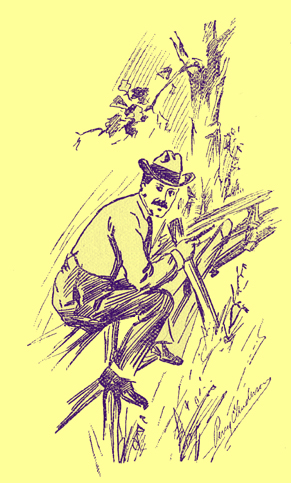 I think Indian summer is the finest time in the year. All seasons are fine, but some are finer than others. That is, if you are in good health and have a clear conscience.
I think Indian summer is the finest time in the year. All seasons are fine, but some are finer than others. That is, if you are in good health and have a clear conscience.
Winter is fine for sitting indoors by the fire; summer is fine for sitting in the shade; but Indian summer is a nice time for being outdoors. I like to be outdoors in Indian summer with nothing much to do. I enjoy doing nothing at any season, but am particularly fond of doing nothing in Indian summer. I like to go through a cornfield when the corn is ripe, and husk out an ear once in awhile to see if it’s well filled. There is something mighty comforting in a big harvest of any kind, but along in Indian summer, when the whole world is yielding its fulness, it’s as good as a full meal just to go out in the country and wander around, falling over pumpkins and things.
I started in to say something about Indian summer, because something ought to be said about it. People 147 have no right to go on enjoying such weather as Indian summer weather and not make acknowledgment. And it isn’t altogether the weather either. It’s partly the comforting assurance that out behind that peaceful haze people are gathering in their bountiful harvests, picking apples, digging potatoes, making kraut, gathering nuts, fattening hogs and turkeys, and so on, that makes the atmosphere of Indian summer so satisfying.
Living in the city is all right, and I believe I’d like it if I had never lived in the country. If a man has a yearning for music and art and things like that the city is not bad, but when he yearns for fat hogs and new plowed ground, the city is little better than a jail.
Of course, you don’t care to hear about such things, but as I rode through the country between Chicago and Cincinnati, I became so attracted by the weather, so fascinated by the fat hogs and pumpkins that it was all I could do to keep from getting off the train at some of the stations and wandering around for a week or so.
I’d like to go out in an orchard and eat a lot of apples and peaches and pears; not the stale, half ripe kind we get in the city, but right off the trees; then I’d like to go into a farmhouse and eat a lot of pork sausage, spare ribs, pumpkin pies, back bones, and some home-made sauer kraut and things like that; then I’d like to drink a lot of milk, sweet cider, buttermilk and spring water; later in the evening I’d want to eat a lot of walnuts, hickory nuts and hazel nuts, and a peck or two of popcorn. I wouldn’t want to do very much work, but I’d like to feed the hogs and milk a few cows. I haven’t milked a cow in fifteen years. Then I’d like to go out in the woods and sit on a rail fence, along toward the shank of some afternoon, and hear the acorns fall and watch the hogs rooting around in the leaves.
148Then I’d go in and eat a lot more and go to bed at 8 o’clock, where I couldn’t hear any street cars or fire engines or milk wagons, couldn’t hear the girl in the next flat playing on her everlasting piano, nor the young man across the street practicing on his cornet. Say, I guess I wouldn’t sleep!
By the time you get this, however, it may be snowing and Indian summer be blow off the face of the earth. That’s the trouble about these good things — they don’t last long enough.
* * *
“By gosh!” said a cheerful old farmer, as he took the seat opposite me, “this is the finest weather I ever saw. Never saw the frost so late. Do you know my sweet tater vines is as green as they was sixty days ago? Never saw the like.
“Where you from? Chicago, eh? In business there? H’m. Got all kinds of folks in Chicago, ain’t you? Told Marier the other day, though, I didn’t see how folks could make a livin’ out of newspapers. Fur as that goes, though, they’se lots of folks live and you can’t tell how they do it.
“I was in Chicago once, an’ I never saw so many people in all my born days. Can’t see what they all do for a livin’. They ain’t no room fer gardens and such things, so I reckon they all live off us farmers some way.
“Reckon you don’t know Bill Tumlin, that lives up there? Didn’t know but you might know him. He lives out Milwaukee avenue way. Bill never was much account when he was a boy. Was too blamed lazy for anything. He went to Chicago, though, and got right along. Got into real estate business and made a lot of money. Ain’t nobody in the family but Bill and his wife and one baby, 149 and they keep a hired girl all the time. Beats all! Thought maybe you might know Bill.
“Prosperity? Well, I want to say that the farmers around here are doin’ mighty well — mighty well. Just sold a bunch of hogs at even $6 a hundred, but that’s too high. When hogs get up to six cents it makes a laborin’ man’s meat cost too much. Things has got to be kinder equal to be healthy. When hogs is $6 a hundred the farmer is makin’ too much money at the expense of the laborin’ man. That’s the way I look at it.
“Well, I’m getting off here. If you’re out Milwaukee avenue way drop in on Bill — Bill Tumlin. I disremember the number exactly, but it’s in that neighborhood som’ers. You can tell him you saw me and he’ll be glad to see you.
“There’s Joe out there! Hello, Joe! Good-bye, stranger. Glad I met you.”
150
IN THE AUTUMN.
_______________
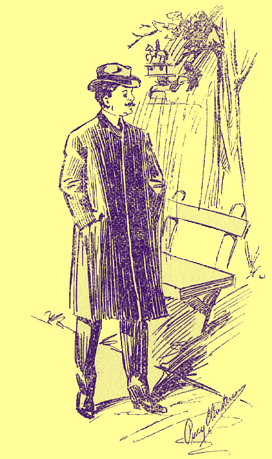 Autumn is to me the saddest time of the year and I cannot account for it. I do not see any special reason why I should be sadder in autumn than at other seasons, but it is so. Of course, there is coal and such things to be laid in, but cutting that all out the fact remains that I am more unhappy in autumn than at any other time. I try my best to throw off the depression. I wreathe my face in smiles and my gay laughter rings out on every occasion; but I only act that way to deceive my creditors, and in my heart I am sad.
Autumn is to me the saddest time of the year and I cannot account for it. I do not see any special reason why I should be sadder in autumn than at other seasons, but it is so. Of course, there is coal and such things to be laid in, but cutting that all out the fact remains that I am more unhappy in autumn than at any other time. I try my best to throw off the depression. I wreathe my face in smiles and my gay laughter rings out on every occasion; but I only act that way to deceive my creditors, and in my heart I am sad.
I wandered out Sunday into the park. The weather was perfect and there was just a tang in the air that spoke of ripening corn, of apple cider when it first begins to bite, of watermelons gathered in the cool of the early morning and stowed away in corn shocks to be eaten in the heat of noon. The heat of summer had gone and the cold of winter hadn’t come. And everything was so restful and quiet, and the grass was so green and the sky so deep and blue it looked as if I ought to have been at least content, but I was not.
151Somehow a load of sadness and responsibility weighed me down, and to save me I couldn’t tell why. I looked across the deserted lagoon at the green and gold of the shadow and light upon the other side, and it seemed to me that if I were over there I would feel better. But after I had walked clear around, blest if I didn’t wish I was right back where I started from. Then I knew I was a victim of that vague longing so aptly expressed by a young lady of my acquaintance.
“I wisht I was ’way over yander,” is what she said.
But why should I feel so? And I sat down in the checkered shade and searched my heart to find what ailed me.
Is it not, I thought, that the autumn of the year is so typical of the autumn of a man’s life that makes the autumn so sad a time? And these are some of the things I thought as I sat in the checkered shade.
In youth, which is as the spring of existence, life seems boundless and endless. We realize in a way that in the dim, distant future there is such a condition as old age, when there must be a finishing off and closing up of things, but it is so very, very far away. And we plan and dream without end.
And then comes the summer of our lives, with its heat and struggle. Some things we find are not what they seemed. Some plans miscarry — but, no matter — there is time for others. And we readjust and reconstruct our scheme of life from the debris of our busted illusions. But there is a lot of time. Oh, dear, yes! a lot of time.
Then the first frost comes and it makes a fellow jump. My goodness! We are not getting old?
But, my dear sir, or madam, I see gray hairs and crowsfeet coming. You are not old, but ten or twelve 152 years from now you’ll be fifty; and people don’t cut much ice in this country after they’re fifty.
Ten or twelve are a good many, of course, but how long has the past ten years been in passing? Think back a little. Not so very far back.
When I was twenty I thought a man of forty quite an elderly man, but now that I am forty, and my friends and associates are about the same, it seems to me we are still all young men; but it won’t do. It is our autumn and we are getting frostbitten. We’ll have to begin to draw in in our little stacks and prepare to top them out. Not very imposing structures, most of the, and we grin to think what we had meant to make them — we’re getting too old and tough to blush.
When a man wins to forty he seems to get to the top of a little hill. Before reaching the top he has not known what is beyond, and his imagination has pictured it. When he reaches the top and looks back over the little space that he has come, and forward over the pitiful little distance he has yet to go, and surveys the utter commonplaceness of the whole proceeding, his first sensation is one of astonishment.
“By gosh!” he says, “is that all?”
That, I thought as I sat beneath the trees last Sunday, is why autumn is so sad a time. You don’t reason all those things out, maybe, but you feel them, and are affected, you scarce know why.
It isn’t that anything has happened yet. The trees and grass are still green and the flowers still blooming. There’s just a little tinge of yellow here and there, where the frost has touched, ever so lightly, and that little tinge of gold adds beauty to it all. It is what is going to happen that is depressing.
For the touch of frost is the touch of death; and that 153 pleasant hard cider tang to the autumn air is the forerunner of the wintry blast.
In the autumn of the year it isn’t that there are, as yet, any flaws in the beauties of summer, but the knowledge that they’ve got to go, that hurts. And in the autumn of a man’s existence it isn’t that the beauty and fragrance of youth have gone, but that he can so easily see the end of them. It is the near approach of winter, when all the beautiful unrealities of youth and summer will be stripped away and nothing be left but the harsh and unlovely realities of age and winter.
But, after all, the winter is not so hard a time if there be a little store of nuts laid by. And after all this grass and washy stuff is gone we may get together and sip tea and gum our toast and shake our jaws in hoary mirth at the young folks making the same mistakes we made, and reveling in the same mistaken happiness.
For there isn’t much substance in that part of Nature which the frost kills. It is washy stuff at best. Take all the leaves on this great oak tree above me and what do they amount to? They are beautiful and they make a pleasant shadow on the grass; that is all. Take all the leaves on all the trees in the park and subject them to the forces of Time and Nature and they won’t produce as much material substance as is in the dornick by the driveway. It is the soul of things that counts; and the soul of things lives through the winter.
* * *
And, after all, it was none of the foregoing things that ailed me. Just when I reached the above point in my meditations my little girl found me and told me it was long past my dinner time. Then I knew what ailed me. I was hungry. Things looked altogether different after dinner.
154
AN ESSAY ON WINTER.
_______________
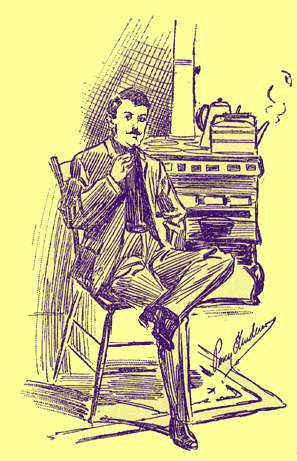 It seems to me it would be wise to write an essay on winter. I have written one on spring, summer and autumn, and now I will write one on winter. This is one on winter:
It seems to me it would be wise to write an essay on winter. I have written one on spring, summer and autumn, and now I will write one on winter. This is one on winter:
Winter is the coldest season of the year. It snows and freezes in the winter, and sometimes becomes very cold indeed. I have seen it so cold I should scarcely bear to go outdoors at all. Sometimes I think I like the winter best of all the seasons. That is when it is so cold I cannot venture out and am compelled to sit by the fire and eat popcorn and apples and those kind of things. I dearly love to sit by the fire and eat.
There are more holidays in winter than in any other season. Winter has three months. December, January and February, and each month has its gay holiday time, which is much enjoyed by all.
Christmas comes on the 25th of December every year, and is a time for receiving gifts. I do not know whether 155 I will receive any gifts this Christmas or not, but I hope I may. What I need most is a new pipe and some tobacco and another pair of socks. The reason I wish for those things is that my present pipe has become strong and rancid, and while I do not notice it myself there are some people who will not stay in the same room where it is; then my present supply of tobacco has become almost exhausted, and one pair of socks is not enough for the winter season. When the weather is very cold they will not dry over night after having been washed, and I am sometimes compelled to lie in bed until noon until they shall have become dry. I do not mind it much to lie in bed, but my time is too valuable to be wasted in such trivialities.
Christmas is also a season for giving gifts. Children meet you on the street or elsewhere and say, “Christmas gift!” whereupon you are expected to cough up if you have anything to cough. Christmas is a merry time.
It is more blessed to give than to receive, but it is more expensive, and for those who have not the wherewithal to meet the expense receiving is the thing. I dearly love to receive gifts.
Besides the beautiful Christmas holiday. December this year has five Sundays in it, which is one more than we have a right to expect and comes as a glad surprise to all.
January has New Year’s Day and four Sundays. February has four Sundays and Lincoln’s and Washington’s birthdays, making seventeen holidays for the season, for which we should all be thankful.
The holidays of other seasons are apt not to be compared to the holidays of winter. The spring has but one, the first of May, and even that is not generally recognized. Besides, the first of May is, in this climate, too cold and 156 windy to sit outdoors and too warm to sit by the fire, so that perfect rest which passeth understanding is not to be obtained.
Easter usually comes in the spring and would be an acceptable holiday but for the fact that, from some strange perversity of fate, it falls on Sunday and is therefore practically wasted.
Summer has but one holiday, the Fourth of July, and it is not a restful day because of the noise. Besides, a holiday in the hot and dusty summer is not so enjoyable as a holiday in the frosty winter. In the winter, when it is too cold to be outdoors you may find comfort by a fire, and with all bodily discomfort dispelled, may devote your entire attention to resting. In the summer it is different. It is too hot indoors and out, and perfect rest is impossible. On a winter holiday I watch the clock and begrudge every second as it passes. In the summer I find myself foolishly wishing for the cool of the evening; and when the cool of the evening comes and I go out and sit on the stoop to watch the fireworks the mosquitoes are very annoying. When it comes to holidays give me the winter time.
There are many sports in winter which are good for man. Those who are fond of exercise may skate, and sleighing is fine for those who do not mind cold feet. As for me, I love to play checkers by the merry fire.
That is all I think about winter.
